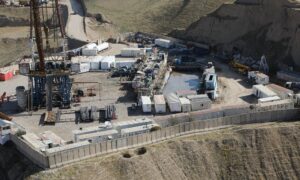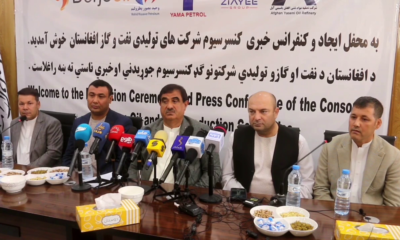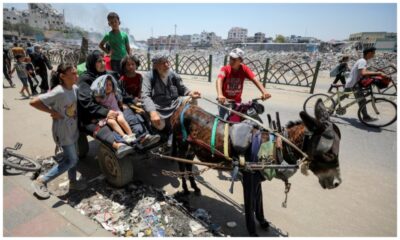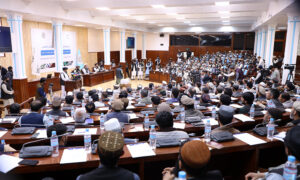Business
Afghanistan’s oil sector is a source of growing interest among investors: IEA
Afghanistan Chamber of Commerce and Investment (ACCI) officials meanwhile called on the ministry to also focus on increasing the operational capacity of established oil extraction companies and in building refineries instead of focusing on attracting foreign investors.

Afghanistan’s Ministry of Mines and Petroleum reports that the country’s lucrative oil sector is generating growing interest from a number of countries in the region including Iran, Turkey, Russia and Uzbekistan.
According to officials, companies in these countries have shown serious interest in investing in the extraction and refinement processes.
The ministry has however called on Afghan investors to also take advantage of opportunities in the sector.
Afghanistan’s Crude Oil Refinery Union has meanwhile urged the Islamic Emirate to support local investors in the extraction process but also by establishing refineries that meet international standards.
Afghanistan’s Crude Oil Refinery Union has meanwhile urged the Islamic Emirate to support local investors
Afghanistan Chamber of Commerce and Investment (ACCI) officials meanwhile called on the ministry to also focus on increasing the operational capacity of established oil extraction companies and in building refineries instead of focusing on attracting foreign investors.
Muhammad Younus Mohmand, Vice-Chairman of the ACCI, said: “Our wish is that the refineries that people invest in, in Afghanistan, should be supported.”
According to union officials, over $300 million has already been invested in the sector in the country, providing jobs to thousands of workers.
Working towards self-sufficiency
Despite having over 200,000 square kilometers of oil and gas reserves, Afghanistan currently purchases nearly 90 percent of its oil and gas needs from Central Asian countries and Iran.
But growing interest from companies in the region could mark a significant shift in Afghanistan’s energy sector, potentially reducing its reliance on imports and boosting regional economic ties.
Earlier this month, the ministry of mines and petroleum reported that it had successfully sold $80 million in crude oil.
For Afghanistan this was a major leap in the direction of growth, especially after China’s Xinjiang Central Asia Petroleum and Gas Company’s (CAPEIC) investment in Afghanistan last year of $49 million has helped boost the country’s daily crude oil output to more than 8,000 bpd.
Spanning Afghanistan and Tajikistan, the Amu Darya basin, where oil is extracted, is estimated to contain 962 million barrels of crude oil and 52,025 billion cubic feet of natural gas.
So far, CAPEIC’s investment of $49 million in Afghanistan has helped boost the country’s daily crude oil output to more than 1,100 metric tons (8,000 barrels per day), a volume that could increase significantly.
Related Stories:
Afghan ministry of commerce meets with stakeholders to build a refinery
Ministry of commerce allocates land for oil refineries
Business
Installation of scanners at Afghanistan’s land ports essential, says Azizi
In conclusion, the ministry stated that the financing mechanism and the method of spending of the private sector support fund have been finalized.
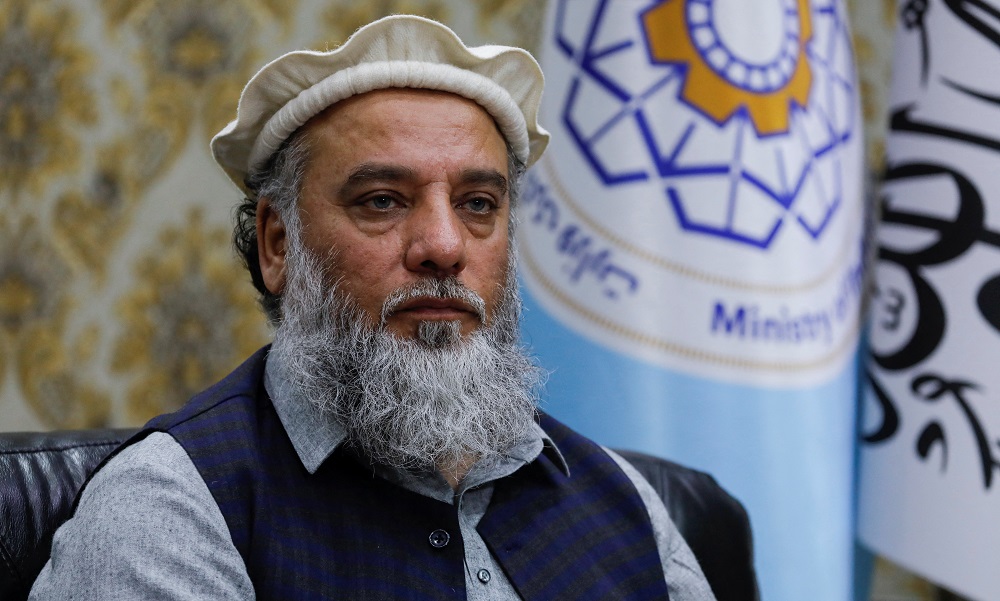
The Ministry of Commerce and Industry says the acting minister has ordered the installation of scanners at the country’s border crossings that deal with imports and exports.
According to a newsletter published by the ministry, the issue was discussed at the first meeting of the leadership committee of the private sector support fund.
Nooruddin Azizi, the acting minister of commerce and industry, said at the meeting that the scanners need to be purchased and installed at land ports to facilitate the import and export of goods.
In this meeting, there was a discussion about the financing mechanism and ways to spend the private sector support fund. Issues around collecting customs fees for imports and exports were also discussed as was the need to open a bank account for the fund.
A decision was also taken to introduce permanent members of the support fund to the leadership committee.
In conclusion, the ministry stated that the financing mechanism and the method of spending of the private sector support fund have been finalized.
Related Stories:
New support fund officially launched for private sector
Economic Commission approves installation of scanners at 12 customs units at border crossings
Business
IEA leader approves law on industrial parks
Azizi asked the United Nations to consider fundamental works and investment in large and incomplete projects in Afghanistan and to solve Afghanistan’s banking problems with the international community.
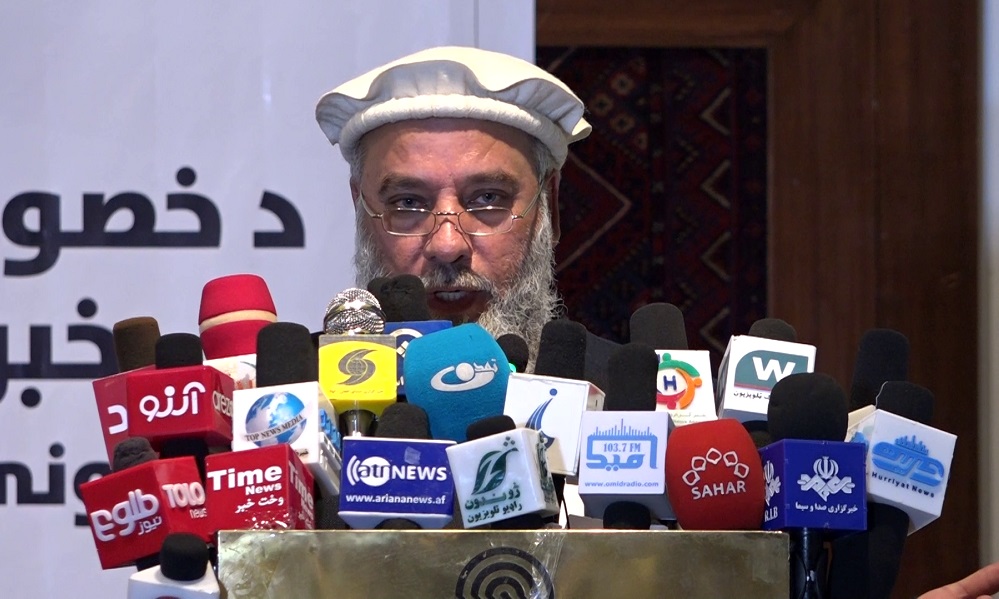
Acting Minister of Industry and Commerce Nooruddin Azizi on Monday announced that a law pertaining to industrial parks has been ratified by the Islamic Emirate’s supreme leader and the process of distributing land to the private sector will begin soon.
“This is good news for the private sector,” Azizi said, speaking at an event in Kabul to discuss the private sector’s challenges and opportunities. “Allah willing, land distribution will start in the future. About 600 applicants want to establish factories in different zones.”
Azizi asked the United Nations to consider fundamental works and investment in large and incomplete projects in Afghanistan and to solve Afghanistan’s banking problems with the international community.
He said that humanitarian aid is not the solution to Afghanistan’s problems.
“It is not support that we gather here, take pictures and send it to the international community. We have to provide fundamental support,” Azizi said.
Indrika Ratwatte, Deputy Special Representative in the United Nations Assistance Mission in Afghanistan (UNAMA), said that Afghanistan should move towards self-sufficiency and stand on its own feet.
He said that the private sector plays a crucial role in this regard.
The representatives of the private sector also emphasized the importance of investment on large and infrastructure projects by the United Nations in Afghanistan. They asked the United Nations to address the country’s banking problems.
“Our banking problems should be addressed. Regarding money transfers, $100,000 is transferred at a cost of $200 in neighboring countries, but it costs $2,000 in Afghanistan. We also need full cooperation in the area of small loans,” said Yunus Momand, the deputy of the Chamber of Commerce and Investment.
The officials of the Ministry of Industry and Commerce also announced at the event that they have distributed licenses to around 1,000 private companies.
Related stories:
Azizi meets with head of Tatarstan on sidelines of Kazan Forum
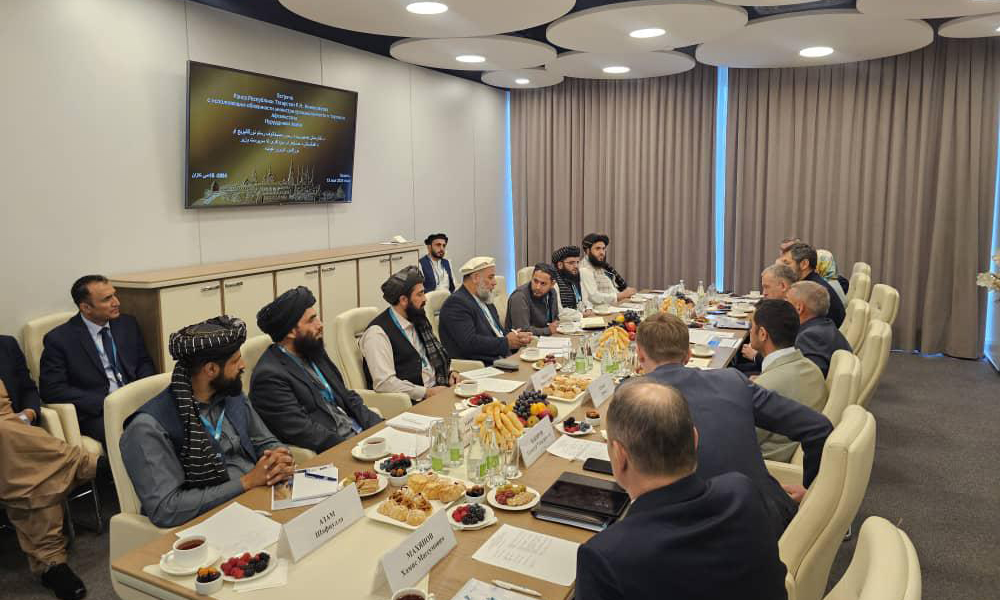
Azizi calls on Malaysian investors to invest in Afghanistan

Business
South Africans, along with Russians, express interest in Afghanistan’s mining sector
In a separate meeting, Russian investors held talks with Afghanistan’s acting minister of mines and petroleum Shahabuddin Delawar on the Balkhab Copper Mine in Sar-e-Pul and Balkh provinces.
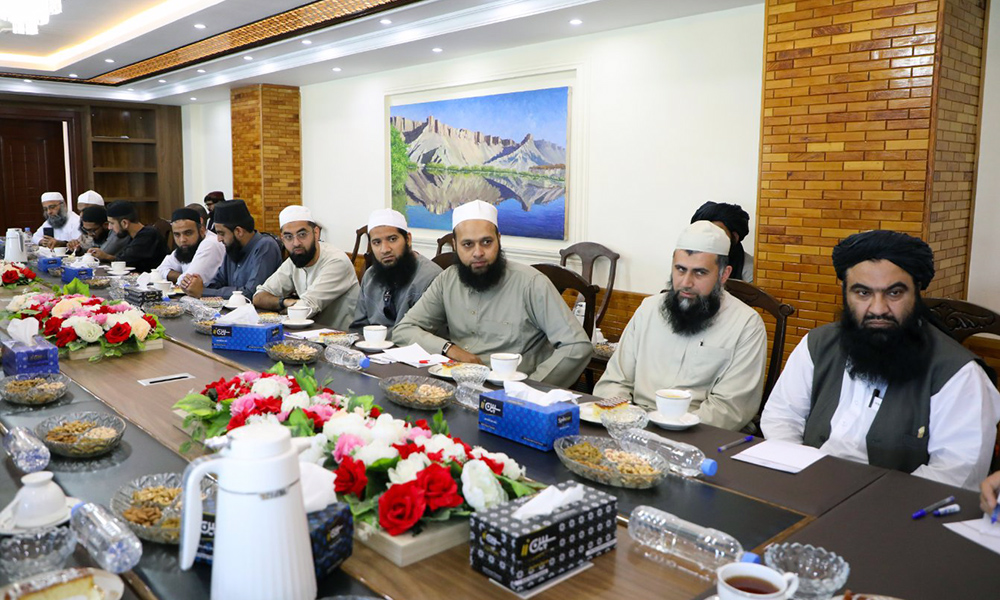
A group of South Africans met with Mullah Abdul Ghani Baradar, the deputy prime minister for economic affairs, in Kabul on Monday to discuss the possibility of investing in Afghanistan’s mining sector.
According to Baradar’s office, the group is keen to invest in the extraction and processing of minerals.
Among the delegation were health sector experts who also stated they would be willing to work with the ministry of public health in Afghanistan to establish a well-equipped hospital.
Baradar assured the delegation of the Islamic Emirate’s full cooperation in both mining and health sectors.
Russian investors
In a separate meeting, Russian investors held talks with Afghanistan’s acting minister of mines and petroleum Shahabuddin Delawar on the Balkhab Copper Mine in Sar-e-Pul and Balkh provinces.
The ministry said in a statement that the Russian investors had been impressed at the opportunities available and had been especially interested in the Balkhab Copper Mine.
Russia is one of the world’s leading mineral industries and is among the leading world producers of a vast range of mineral commodities, including aluminum, cement, copper, magnesium compounds and metals, gas, and oil among others.
In 2019, the country was the second worldwide producer of platinum, vanadium and cobalt. It also has huge reserves of gold, silver and uranium.
South Africa meanwhile has a vast mining industry and is most well-known for its gold, diamonds, platinum and coal resources and the mining industry is a primary economic contributor.
Related Stories:
Investing in Afghanistan mines can be profitable for Iranian industry: Qiafeh
Nearly 1 billion AFN invested in mines so far this year: officials
-

 Sport4 days ago
Sport4 days ago‘I can sleep better now’, says Rashid Khan after Afghanistan’s win over Australia
-

 Sport5 days ago
Sport5 days agoAfghanistan pulls off stunning upset against Australia in T20 World Cup match
-

 Sport2 days ago
Sport2 days agoSemi-final schedule confirmed for T20 World Cup
-

 Regional4 days ago
Regional4 days agoEgypt cracks down on tourism companies after over 530 deaths during hajj
-

 Latest News5 days ago
Latest News5 days agoNicaragua names ambassador to Afghanistan
-

 Latest News4 days ago
Latest News4 days agoFirst Panjshir emerald expo will launch in under three weeks
-
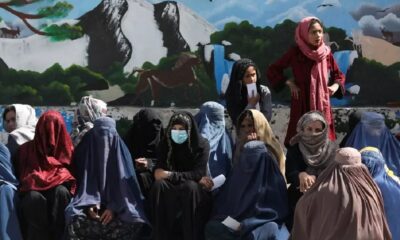
 Latest News4 days ago
Latest News4 days agoRights groups upset over exclusion of Afghan women at UN-led Doha meeting
-
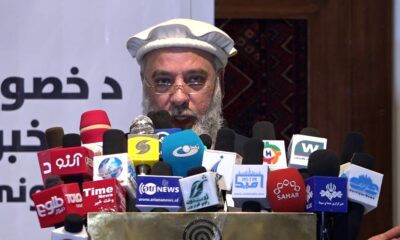
 Business3 days ago
Business3 days agoIEA leader approves law on industrial parks


